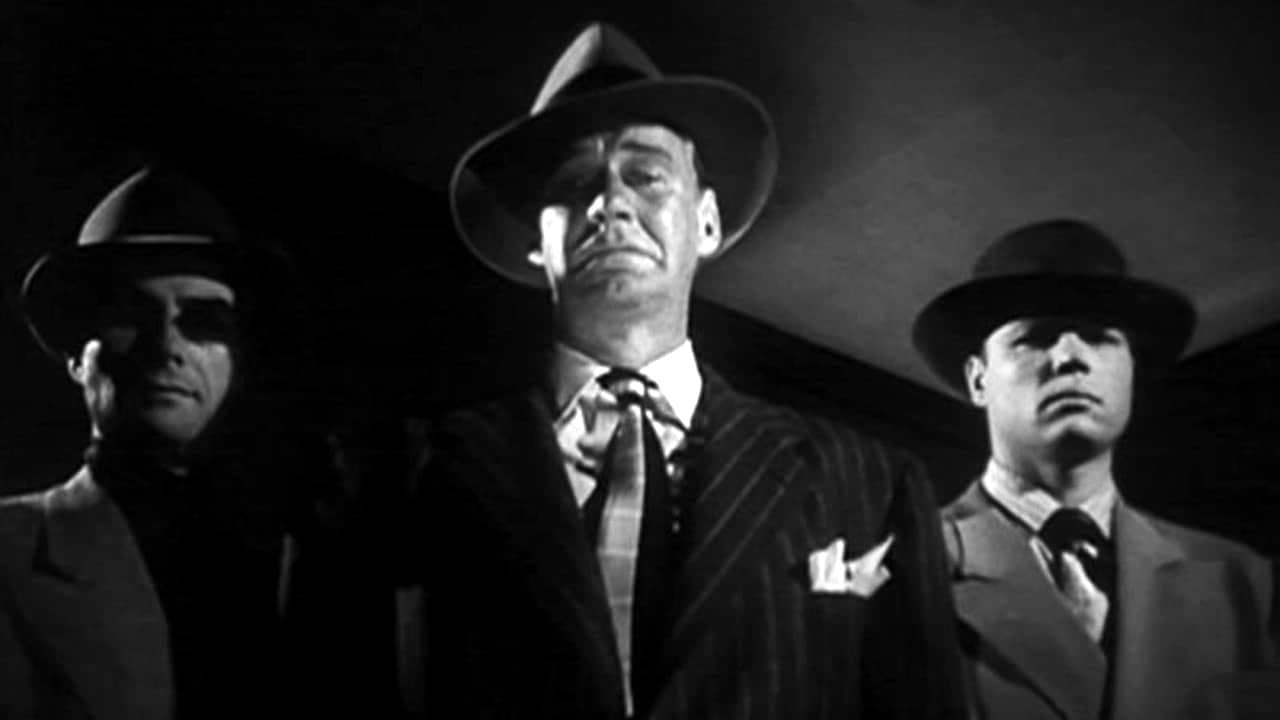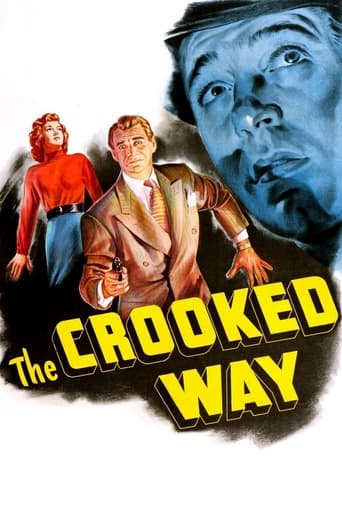


ridiculous rating
... View MoreI am only giving this movie a 1 for the great cast, though I can't imagine what any of them were thinking. This movie was horrible
... View MoreThis is a coming of age storyline that you've seen in one form or another for decades. It takes a truly unique voice to make yet another one worth watching.
... View MoreStrong acting helps the film overcome an uncertain premise and create characters that hold our attention absolutely.
... View More"Johnny One-Eye" director Robert Florey's crime thriller "The Crooked Way," starring John Payne and Sonny Tufts, qualifies as an above-average example of film noir, distinguished in part by "He Walked by Night" lenser John Alton and his atmospheric black & white cinematography. Alton endows this tense, but derivative law and order saga with an ominous sense of foreboding. Ostensibly based on Robert Monroe's radio play "No Blade Too Sharp," "Back to Bataan" scenarist Richard H. Landau has taken the narrative convention about a protagonist that suffers from amnesia to the next level. Most films about amnesiacs allow them to recover their memory long before fade-out. For example, co-writer & director Joseph L. Mankiewicz earlier made "Somewhere in the Night," about a GI with amnesia who comes home and finds himself tangled up in a plot to recover Nazi gold. To my knowledge, I don't think Hollywood has made another movie roughly like Florey's "The Crooked Way." The biggest problem with this movie is that the hero remains passive for far too long. Meanwhile, his chief nemesis is well played by Sonny Turfs. The action transpires in bars, night clubs, the back rooms of gambling joints, and occasionally in a warehouse. The cops believe the worst about our hero and he finds himself predictably up to his neck in trouble. One thing different about the hero is his ability to shoot at and generally hit and kill his adversaries. As one thug observes after Eddie Rice has plugged a henchman: "He shot him for breakfast, lunch, and dinner." The character that heroic John Payne portrays differs from the usual amnesiac. Most amnesiacs struggle with psychological amnesia. Meaning, they will eventually recover their memories. Eddie Rice (John Payne of "Kansas City Confidential"), a.k.a. Eddie Riccardi, marched off to join the ranks for the Army in World War II and then spent five years in a psychiatric hospital because he had been wounded and had forgotten just about everything about himself. During combat, Eddie survived a devastating shrapnel wound. Army doctors removed most of the fragments, but they left one behind. Per the doctors, an operation to eliminate the last piece of shrapnel might place Eddie's life in jeopardy. You see, that piece of shrapnel in Eddie's head had generated thick scar tissue around it. Reluctantly, they allowed Eddie to leave the hospital and go back to his hometown of Los Angeles. The problem is that Eddie knows very little about himself, and Army Intelligence has not been able to dig up much more beyond what they know. No sooner has Eddie arrived in his old stomping ground of Los Angeles than a tenacious cop, Police Lieutenant Joe Williams (Rhys Williams of "The Sons of Katie Elder"), hauls our hero into headquarters and gives him the third degree. Eddie looks at a rap sheet and sees that his real name is Eddie Riccardi, but this knowledge doesn't change anything for him. Indeed, he is incredulous that he was a criminal. Williams is dubious about Eddie's claim that he received a Silver Star and has been hospitalized for war wounds. Lieutenant Williams recommends that Eddie leave town. Our hero, however, doesn't have a chance to get out of town before a homicidal mobster, Vince Alexander (Sonny Tufts of "The Seven Year Itch"), learns about his presence and pays him an unpleasant visit. It seems that Vince and Eddie had once been partners, and Eddie blew town and Vince wound up taking the rap and spend some time behind bars. Detective Williams visits Vince after one of the lieutenant's stooge pigeons, Kelly (John Harmon), turns up murdered. Williams grilles Vince, and Vince shoots him. When the villains locate Eddie, they slug him unconscious and put his fingerprints all over the pistol that Vince used to kill Eddie. Eddie has just enough time to get out of the car parked on the side of the road and contains Detective Williams. He hitches a ride in an undertaker's van, and the police track him down to a warehouse where Eddie has knocked off two of Vince's henchmen and is facing down Vince. The police arrive and riddle Vince with a wave of gunfire.John Payne delivers an appropriately tight-lipped performance as the sympathetic but strong protagonist. The problem is that he is a passive rather than an active hero. The authorities and criminals keep pushing him around until he takes charge in the last quarter hour of the action. One thing that is done extremely well is Eddie Rice's superb marksmanship. He doesn't miss his targets. Williams is perfect as a driven police detective who thinks everything about Eddie stinks. Sonny Tufts is good as Eddie's chief nemesis. One of Vince's flaws is that he uses a drug to control nervousness that gives him away as the real dastard. Although the premise is good, the plot is straight-forward and predictable, but director Florey handles the action with competence.
... View MoreThe Crooked Way is directed by Robert Florey and adapted to screenplay by Richard H. Landau from the Radio Play "No Blade Too Sharp" by Robert Monroe. It stars John Payne, Sonny Tufts, Ellen Drew, Rhys Williams, Harry Bronson and Hal Baylor. Music is by Louis Forbes and cinematography by John Alton. World War II veteran Eddie Rice (Payne) is suffering from permanent amnesia after a piece of shrapnel was lodged in his brain. With no recollection of his past life, he heads off to the only place he has a link with, the army registration office in Los Angeles. No sooner does he arrive there he is picked up by the cops, and soon his past life slowly begins to piece together, and it doesn't make for good news at all The amnesia plot device is served up once again for a film noir make-over, with mixed results. As a story it just about registers as interesting, there's not nearly enough made of the premise, with much of Eddie's memory recollections a bit too convenient for comfortable dramatic purpose. The smart hook is that Eddie, now a genuine nice guy, begins to find out he was something of bad man, very much so, and there are plenty of people displeased with him. There's also some considerable violence dotted throughout, aggression is palpable, while lead cast performances are more than adequate for the material to hand. However, on a visual level The Crooked Way is on a different planet to the screenplay. John Alton brings all his skills as a film noir cinematographer here, photographing the whole film through a noir kaleidoscope. Characters move through shadows and light, or are bathed in various dark reflections, with the interior sequences brilliantly adding an aura of mental fog. With Florey throwing his bit in the mix as well, with canted angles and isolated lighting of the eyes, it's a top draw noir of the film making style. Their work deserves a better story, but regardless, because of the tech quality and the safe nature of the premise, this has to be a comfortable recommendation to anyone interested in film noir. 7/10
... View MoreLike another warbler, Dick Powell, John Payne saw himself as a tough guy. So after fighting the war in films and singing in musical movies during the war, he went more and more into noirs, even producing one, Kansas City Confidential.In this film, which reminded me of Somewhere in the Night, Payne plays a war hero, given the Silver Star, who knows himself as Eddie Rice. He has a steel plate in his head from a battle injury and has permanent amnesia. He wants to know who he is, so he takes what information the doctor has on him and goes to Los Angles. He soon learns he was a thug, and a double-crossing thug at that, and the list of people who want to get even with him -- Eddie Riccardi -- is long.This is a pretty good movie, with great cinematography by John Alton, photographed in true noir fashion.Payne is very effective in his role. He was always a good, likable actor with impressive looks. He also had a brain in his head, putting his own money into Miracle on 34th Street when the studio was less than enthusiastic (and released it in August) and heavily investing in real estate. As Nina, Ellen Drew is good and very attractive.As a criticism -- I realize that in 1949 Los Angeles wasn't as populated as it is today, but it certainly had more than a dozen or so people in it. The minute this guy gets off the train, he starts running into people who know him, some of whom want him dead. Let's just say word spread instantly, with no twitter or texting.
... View MoreA WW2 vet (John Payne) returns to Los Angeles from a rehab hospital in San Francisco to try to recoup his past after losing his memory during the war as a result of shrapnel that is too embedded in his brain to remove. This being a film noir, his past turns out to have been mostly spent on the other side of the law but is now atoned for in the audiences' eyes as he fought bravely enough in the war to have been awarded a Silver Star. However to the authorities in LA, it's a different story. A couple of LA detectives recognize him as someone they knew from before the war as he is departing the train station as he arrives back in LA and whisk him away to headquarters where no one believes his amnesia story or his medals, giving him his first hints as to who he is and was. He goes from being ex-soldier Eddie Rice to the underworld Eddie Riccardi, and the film explores which of these two possibilities he will end up as. The Riccardi character was involved before he went away to war with crime boss Vince Alexander who is played by Sonny Tufts. Payne is decidedly better than decent but Tufts seems downright impressive, especially at the beginning when he's having someone beaten up and then killed by two of his goons. The relationship between Payne's and Tuft's characters gets revealed as well as that of the relationship with night club singer Nina Martin (Ellen Drew). Directed by Robert Florey (Danger Signal), the pace is excellent, and the photography by John Alton captures some memorable scenes of near total darkness with nothing but the characters' outlines to be made out.
... View More